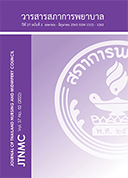Life Experiences of Older Persons with Mild Cognitive Impairment: A Qualitative Meta-Synthesis
Keywords:
life experiences, meta-ethnography, mild cognitive impairment, older personsAbstract
Objective: To synthesise data on experiences of older persons with mild cognitive impairment (MCI)
Design: A qualitative meta-ethnography approach
Methodology: This article is based on a search of qualitative research articles published in Thai and English between 2010 and 2020 in international nursing science and multidisciplinary journal databases, namely, CINAHL, Pubmed, Science, Direct, Google scholar, TCI and ThaiLIS, following the PICO framework. The selected articles were qualitatively assessed using the Critical Appraisal Skills Programme (CASP) and their meta-synthesis dependability and credibility were evaluated using the ConQual approach.
Results: In total, 1,083 articles were collected, eight of which satisfed the inclusion criteria. Based on the meta-ethnographic examination of these eight articles, a conceptual defnition of life experience of older persons with mild cognitive impairment was synthesised. The synthesised defnition involves three major conditions, namely, 1) predominant mild cognitive impairment symptoms as perceived by older persons; 2) effects of mild cognitive impairment symptoms as perceived by older persons; and 3) adjustment of lifestyle by older persons with mild cognitive impairment. The ConQual evaluation rated these articles’ meta-synthesis dependability and credibility as being at a high level.
Recommendations: It is recommended that care for older persons with mild cognitive impairment be adjusted in line with their perceived life experiences of MCI predominant symptoms and effects, and with necessary lifestyle adjustment.
Downloads
References
Petersen RC, Smith GE, Waring SC, Ivnik RJ, Tanglos EG, Kokmen E. Mild cognitive impairment: clinical characterization and outcome. Arch Neurol 1999; 56:303-8
Udomittipong D, Channakorn P, Narongsak T, Chimnakboon N. Cognitive stimulation for elderly with mild cognitive impairment: review article. J Somdet Chaopraya Inst Psychiat 2021;15(1):1-23 (in Thai)
Limpawattana P, Manjavong M. Mild cognitive impairment. KKUJM 2020;6(1):25-35. (in Thai)
Brodaty H, Breteler MM, Dekosky ST,et al. The world of dementia beyond 2020. J Am Geriatr Soc 2011; 20:423-8
Daly MP. Dementia. In: Adelman AM, Daly MP, Weiss BD, editors. 20 common problems in geriatrics. Singapore: McGraw-Hill; 2011:237-60.
Intolo S, Sritanyarat W. Experience of older persons in the oversea living alone: systematic review and meta synthesis. Journal of Nursing Science & Health 2017;40(4):72–82. (in Thai)
Chaiyasit Y, Thong-on R, Piboonrungroj P & Kotta P. The roles of spirituality in people living with HIV/ AID: a qualitative meta–synthesis. BKKMEDJ 2019; 15(1):113-120.
Roberts JL, & Clare L. Meta–representation awareness in mild cognitive impairment: an interpretative phenomenological analysis. Aging Ment Health 2012;17(3):300–9.
Berg AI, Willin A, Nordlund A, & Johansson B. Living with stable MCI: experience among 17 individuals evaluated at a memory clinic. . Aging Ment Health 2013;17(3):293-99.
Neville CE, McCourt HJ, McKinley MC, Lowis C, Barrett SL, McGuinness B, et.al. Encouraging lifestyle behavior change in mild cognitive impairment patients: development of appropriate education material. Aging Ment Health 2013;17(3):273 – 86.
Johasson MM, Marcusson J, & Wressle E. Cognitive impairment and its consequences in everyday life: experience of people with mild cognitive impairment or mild dementia and their relatives. Int Psychogeriatr 2015;27(6):1–10.
Peach T, Pollock K, van der Ward V, das Nair R, Logan P, & Harwood RH. Attitudes of older people with mild dementia and mild cognitive impairment and their relatives about falls risk and prevention: a qualitative study. PLoS ONE 2017;12(5):1-15.
Mattos MK, Burke LE, Baernhold M, Hu L, Nilsen ML, & Linger JH. Perceived social determinants of health among older rural-dwelling adults with early-stage cognitive impairment. Dementia 2019;18(3):920–35.
Bechard EL, Beaton D, McGilton KS., Tartaglia CM, & Black SE. Physical activity perceptions, experiences, and beliefs of older adults with mild cognitive impairment or Alzheimer’s disease and their care partners. Appl Physiol Nutr Metabol 2020;45:1216–24.
Morris JL, Hu L, Hunsaker A, Liptak A, Burher J, & Lingler JL. Patients’ and family member’s subjective experiences of a diagnostic evaluation of mild cognitive impairment. J Patient Exp 2018;7(1):124–31.
Gomersall T, Astell A, Nygård L, Sixsmith A, Mihailidis A, & Hwang A. Living with ambiguity: a metasynthesis of qualitative research on mild cognitive impairment. Gerontologist 2015; 55(5);892-912.
Noblit G W & Hare R D. Meta-ethnography: synthesis qualitative studies. Newbury Park: Sage ; 1988.
Magsrithonkam B. Meta-ethnography synthesis: qualitative research synthesis. Journal of Nursing Division 2009;36(2):77-85. (in Thai)
The Critical Appraisal Skills Programme (CASP). CASP checklist: 10 questions to help you make sense of a qualitative research [Internet].Oxford:Critical Appraisal Skill Programme; 2018 [cited 2022 Feb 8]. Available from: https://cas p-uk.net/w p-content/uploads/2018/03/CA S P -Qualitative-Checklist-2018_fllable_form.pdf.
Kummatid A & Markrat M. Using the systematic review to provide a complete summary on a research question in evidence-based practice: a 3-step method. SCNJ 2016;3(3): 246-59. (in Thai)
Munn Z, Porritt K, Lockwood C, Aromataris E, & Pearson A. Establishing confdence in the output of qualitative research synthesis: the ConQual approach. BMC Med Res Methodol 2014;14:1-7
Assaf G, Tanielein M. Mild cognitive impairment in primary care: a clinical review. Postgrad Med J 2018;94:647-52
Kardtip T, Monkong A, Malathum P. Health status of older adults with cognitive impairment. JTNMC 2019;34(1):104 – 21. (in Thai)
Ngandu T, Lehtisalo J, Solomon A, et al. A 2 year multidomain intervention of diet, exercise, cognitive training, and vascular risk monitoring versus control to prevent cognitive decline in at-risk elderly people (FINGER): a randomized controlled trial. Lancet Lond Engl 2015;385:2255–63
Limpawattana P. Geriatric syndromes and interesting health topics. Klungnana Vitthaya: Khon Kaen; 2017.
Mon S , Tiraphat S & Jayasvasti I. Factors associated with mild cognitive impairment among the communitydwelling elderly in the urban area of Kyauk Tan Township, Myanmar. Journal Public Hlth and Dev 2017; 15 (1) : 63 - 79
Downloads
Published
How to Cite
Issue
Section
License
Copyright (c) 2022 Thai Journal of Nursing Council

This work is licensed under a Creative Commons Attribution-NonCommercial-NoDerivatives 4.0 International License.








